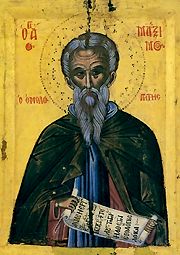Saint Maximos the Confessor
January 21st
Troparion (Tone 3)
Through thee the Spirit poured forth streams of teaching for the Church: thou didst expound God the Word's self-emptying, and shine forth in thy struggles as a true Confessor of the Faith; holy Father Maximos, pray to Christ our God to grant us His great mercy.
St. Maximos the Confessor defended Orthodoxy against the Monothelite heresy which tried to assert that Christ only had a divine will and thus was not fully man. St. Maximos had to endure persecution from both the Emperor and the Patriarch. He was tortured and ridiculed in unspeakable fashion. His tongue was cut off along with his hand. God miraculously restored his hand. He reposed in the Lord in 662.
Source:
http://www.comeandseeicons.com/m/phn60.htm
Maximus the Confessor
From OrthodoxWiki
Our venerable and God-bearing Father Maximus the Confessor (ca. 580-662) was an Orthodox Christian monk and ascetical writer known especially for his courageous fight against the heresy of Monothelitism. His feast days in the Church are celebrated on January 21 and, for the translation of his relics, on August 13.
Life
He was born in the region of Constantinople, was well educated, and spent some time in government service before becoming a monk, having been a member of the old Byzantine aristocracy and holding the post of Imperial Secretary under Emperor Heraclius. Around 614, he became a monk (later abbot) at the monastery of Chrysopolis. During the Persian invasion of the Empire (614), he fled to Africa.
From about 640 on, he became the determined opponent of Monothelitism, the heretical teaching that Jesus Christ had only one will. In this, he followed the example of St. Sophronius of Jerusalem, who was the first to combat this heresy starting in 634.
Maximus supported the Orthodoxy of Rome on this matter and is said to have exclaimed: "I have the faith of the Latins, but the language of the Greeks." He argued for Dyothelitism, the Orthodox teaching that Jesus Christ possessed two wills (one divine and one human), rather than the one will posited by Monothelitism.
After Pyrrhus, the temporarily deposed Monothelite Patriarch of Constantinople, had declared his defeat in a dispute at Carthage (645), Maximus obtained the heresy's condemnation at several local synods in Africa, and also worked to have it condemned at the Lateran Council of 649. He was brought to Constantinople in 653, pressured to adhere to the Typos of Emperor Constans II. Refusing to do so, he was exiled to Thrace. (Pope St. Martin of Rome was tried around the same time in Constantinople, and thus deposed and exiled to Crimea.)
In 661 Maximus again was brought to the imperial capital and questioned; while there, he had his tongue uprooted and his right hand cut off (to prevent him from preaching or writing the true faith), and then was again exiled to the Caucasus, but died shortly thereafter.
Ultimately, Maximus was exonerated by the Sixth Ecumenical Council and recognized as a Father of the Church.
Writings
He left many writings (some of which are collected in the Philokalia) that are still widely read today; some are doctrinal, but many more describe the contemplative life and offer spiritual advice. He also wrote widely on liturgical and exegetical subjects. His theological work was later continued by St. Simeon the New Theologian and by St. Gregory Palamas.
His writings include:
- Quaestiones ad Thalassium—65 questions and answers on difficult passages of Holy Scripture
- Ambigua—an exegetical work on St. Gregory the Theologian
- Paraphrases of the works of Dionysius the Areopagite (though many of the works that have come down under Maximus' name are now held to be the work of John of Scythopolis, who wrote in the first half of the 6th century, some 100 years before Maximus)
- Several dogmatic treatises against the Monothelites
- Liber Asceticus
- Capita de Caritate
- Mystagogia—a mystical interpretation of the Divine Liturgy
Hymns
Troparion (Tone 8) [1]- Champion of Orthodoxy, teacher of purity and of true worship,
- Enlightener of the universe and adornment of hierarchs:
- All-wise father Maximus, your teachings have gleamed with light upon all things.
- Intercede before Christ God to save our souls.
- Let us the faithful fittingly praise the lover of the Trinity,
- The great Maximus who taught the God-inspired faith,
- That Christ is to be glorified in His two natures, wills, and energies;
- And let us cry to him: "Rejoice, herald of the faith."
Sources
- w:Maximus the Confessor
- The Oxford Dictionary of the Christian Church, 3rd ed., pp. 1061-1062
External links
- St Maximus the Confessor (OCA)
- Translation of the relics of St Maximus the Confessor (OCA)
- Maximos the Confessor, January 21 (GOARCH)
- Maximos the Confessor, August 13 (GOARCH)
- Icon of St. Maximos the Confessor
Writings
SOURCE:
http://orthodoxwiki.org/Maximus_the_Confessor


No comments:
Post a Comment